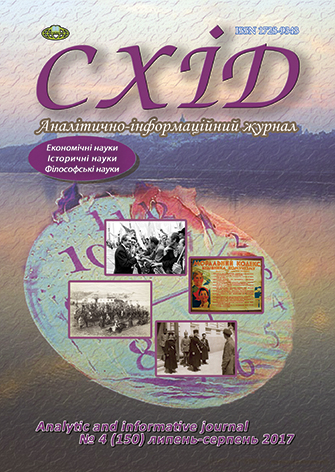Value of tax elements of fiscal mechanism in achieving tasks of sustainable economic development
DOI:
https://doi.org/10.21847/1728-9343.2017.4(150).109518Keywords:
fiscal mechanism, imperatives of sustainable development, taxes, fiscal policyAbstract
The author describes the state's fulfillment of the fiscal mechanism which is capable to provide sufficient financial coverage of the state and local budgets; facilitate the achievement of strategic priorities of steady development in the state and regions through rational and substantiated usage of material, social and natural resources. The role of tax elements within the fiscal mechanism in providing the ecological, economic and social imperative of social development in Ukraine is evaluated.
The structure of the fiscal mechanism is offered. The author shows that the key elements of it include the mechanism of revenue mobilization, distribution and usage of budget income, maintenance of the intergovernmental budget balance and public debt management. The author emphasizes that in the mechanism of income mobilization, besides the mechanism for mobilizing intergovernmental and official transfers and the non-tax mechanism, a dominant role plays the tax mechanism of income mobilization.
The author claims that at present there are significant reserves for improving the efficiency of the tax elements in the fiscal mechanism. The author proves that it is expedient to increase the environmental role of ecological taxes because despite the significant rise of ecological tax receipts, their amount is still lower than the level of financing of capital and current expenses which are aimed to protect and restore the natural environment.
The author demonstrates the need to ensure a fair redistribution of income which is based on the growth of the social role of income taxation and establishment of high social standards for the estimation of labor force cost. The author states that its level in Ukraine is rather low if to compare its average index in the countries of the European Union. The author denotes that there is an urgent need to expand the range of tax privileges and preferences for activating entrepreneurial activity in the state, with increasing of the fiscal control over the effectiveness of their use.Downloads
References
Paton, B. E. [ed.] (2012), National Paradigm of Sustainable Development of Ukraine, State Institution «Institute for the Economics of Natural Resources and Sustainable Development of the National Academy of Sciences of Ukraine», Kyiv, 72 р. (ukr)
Ilyina, M.V. & Shpilyova, Yu.B. (2017), Social and environmental imperatives as the theoretical basis of the policy of sustainable development of society. Electronic resource: Access mode: http://ecos.kiev.ua/news/view/459
Resolution of the United Nations General Assembly dated September 25, 2015. available at: https://documents-dds-ny.un.org/doc/UNDOC/GEN/N15/291/92/PDF/N1529192 .pdf
Tropina, V.B. (2011), Public Finances in the Realization of the Social Function of the State, Chernigov Scientific Journal. No. 2 (2). рр. 77-84.
Aleskerova, Yu. V. (2016), The fiscal mechanism of the socio-economic sphere as an integral part of the financial mechanism of the state, Black Sea Economic Studies. Voice over 3. рр. 98-101. available at: http://nbuv.gov.ua/UJRN/bses_2016_3_22
Kantsur, I.G. (2015), Fiscal Mechanism: Essence, Instruments and Principles of its Action, The World of Finance, p.117-129 (ukr).
Fedorishina, L.I. & Zhmurko, I.V. (2016), Social and fiscal policy of the state: influence at the regional level, Global and national problems of the economy. No. 12. р. 468-473 (ukr).
Tax Code of Ukraine (2010), Law of Ukraine dated 02.12.2010 No. 2755-VI available at: http://zakon.rada.gov.ua
On amendments to the Budget Code of Ukraine on the reform of intergovernmental fiscal relations (2014), Law of Ukraine dated December 28, 2014 No. 79-VIII, available at: http://zakon2.rada.gov.ua/laws/show/79-19
Nikitshin, A. (2017), Tax regulation as an instrument of the state ecological policy, Foreign trade: economy, finance, law. №2. р. 128 (ukr).
Official website of the Ministry of Ecology and Natural Resources. Electronic resource: Access mode: https://menr.gov.ua
The main principles (strategy) of the state environmental policy of Ukraine for the period up to 2020 (2011), Approved by the Law of Ukraine «On the main principles (strategy) of the state environmental policy of Ukraine for the period up to 2020», Bulletin of the Verkhovna Rada of Ukraine, No. 26, Art. 218.
Labor costs in Ukraine and the European Union. available at: http://edclub.com.ua/analityka/vytraty-na-robochu-sylu-v-ukrayini-ta-yevropeyskomu-soyuzi
Sibirianska, Yu. & Pernikoza, P. (2017), Fiscal and Social Effects of Reforming the Tax on Individuals’ Income in Ukraine. Financial and Economic Analysis, Office in the Verkhovna Rada of Ukraine. Kiev (ukr).
Law of Ukraine «On the subsistence minimum» dated July 15, 1999, No. 966-ХІV, available at: http://zakon3.rada.gov.ua/laws/show/966-14
Official website of the Ministry of Finance of Ukraine, available at: https://www.minfin.gov.ua
Official website of the State Treasury of Ukraine, available at: http: //www.treasury.gov.ua
Official website of the State Statistics Service of Ukraine, available at: http://www.ukrstat.gov.ua
Оfficial website of the European Union (Eurostat), available at: http://ec.europa.eu/eurostat
Downloads
Published
How to Cite
Issue
Section
License
Copyright (c) 2017 Olena Sydorovych

This work is licensed under a Creative Commons Attribution-NonCommercial-NoDerivatives 4.0 International License.
1. Authors bear responsibility for the accuracy of facts, quotations, numbers and names used.
2. Manuscripts are not sent back.
3. The publisher does not always agree with the authors' opinion.
4. The authors reserve the right to authorship of the work and pass the first publication right of this work to the journal under the terms of a Creative Commons Attribution-NonCommercial-NoDerivatives 4.0 International License. This license allows others to distribute (copy) the published work for non-commercial purposes, provided there is mandatory attribution to its authors and a link to the first publication in our journal.
5. The authors have the right to conclude separate supplement agreements that relate to non-exclusive work distribution in the form in which it has been published by the journal (for example, to upload the work to the online storage of the journal or publish it as part of a monograph), provided that the reference to the first publication of the work in this journal is included.

